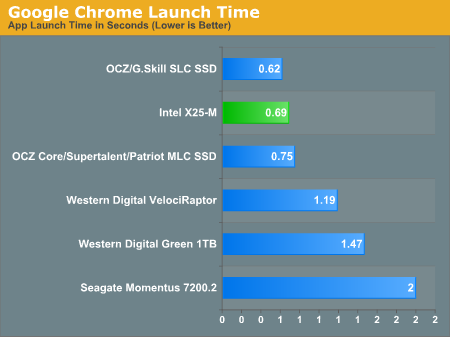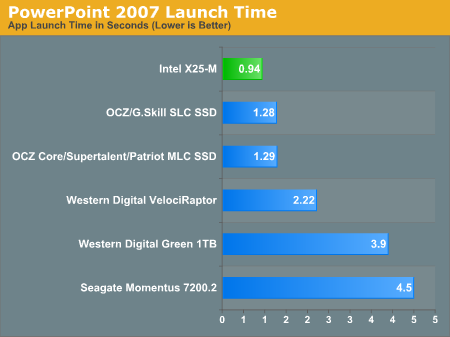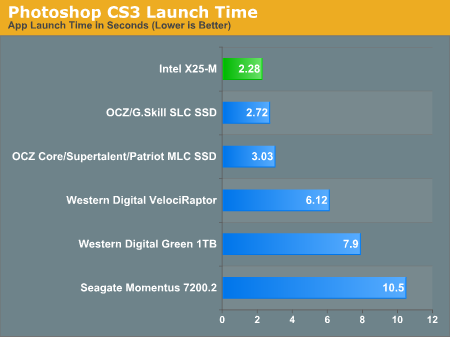Intel X25-M SSD: Intel Delivers One of the World's Fastest Drives
by Anand Lal Shimpi on September 8, 2008 4:00 PM EST- Posted in
- Storage
Application Loading Performance
You know what I hate about rebooting my machine? Starting all of my applications back up as soon as it boots, the OS is always crunching away at my disk long after I've hit my desktop and it takes forever to launch my mail application, IM client and start a web browser. These aren't complex requests, but they take forever on a conventional hard disk.
I ran a quick test to illustrate the point. I took my test image and booted it, as soon as I got a cursor in Vista I launched Adobe Photoshop CS3, PCMark Vantage, Google Chrome and Norton AntiVirus 2008. I timed how long it took for all four applications to come up. Note that this is actually a best case scenario, since my testbed image is very clean with a minimal number of applications installed. As you fill up your disk with more applications and files the disparity grows. Remember that HDD performance decreases as your drive fills up, SSD performance doesn't.
| Launch: Photoshop, Vantage, Chrome & NAV | |
| Intel X25-M (Intel, MLC) | 7 seconds |
| Western Digital Green 1TB | 15.6 seconds |
| Western Digital VelociRaptor | 12 seconds |
The differences in time here aren't huge on paper, but they are tremendous when you're actually using the machine. The funny thing about an SSD is you don't always appreciate the benefit when you've got it, but go back to a mechanical disk and it'll feel like something is wrong with your machine. The difference is noticeable.
Now let's look at individual application performance:

Google Chrome launches quickly on pretty much anything, the difference between SSDs is negligible but there is a slightly noticeable difference between running a simple, quick loading app on a HDD vs. a SSD. Again, the differences are small, but noticeable. On an SSD the application launches are instantaneous, on a HDD you can "feel" the load.

PowerPoint is similar to Chrome, but the application does take longer to load on mechanical disks. Again, the differences are noticeable - the X25-M will load PowerPoint in half the time of the VelociRaptor. You can argue that the price isn't worth it, but the point is that the load completes much faster...let's look at what happens when we're loading an application that does take a long time to start.
Photoshop takes its sweet time loading on a notebook drive, over 10 seconds on the Momentus 7200.2:

Even on the VelociRaptor it's a 6+ second ordeal. On the X25-M and all of the other SSDs, we're talking less than 3 seconds (the X25-M is naturally the fastest at 2.3 seconds).
My rule of thumb has always been that a good SSD will cut application launch times in half compared to a desktop hard drive, so if you have a particularly beefy application that takes a good while to load, expect that time to go down considerably. Remember, these are best case scenarios, in a little bit I'll start multitasking and then we'll separate the men from the boys.










96 Comments
View All Comments
bharatwaja - Tuesday, September 9, 2008 - link
This is by far the best article I have ever read about SSDs... Anand you ROCK!!! and EVERYONE at ANANDTECH ROCKS!....Great article... Thank you........ you just saved me from spending $99 on a pretty much useless SSD.
[Takes a printout of Anand to worship]
hyperdoggy - Tuesday, September 9, 2008 - link
I noticed that ocz have released core v2 series of their ssd. It seems to come in a different size configurations than its 1st gen product, can you confirm if this is based on the same controller as its 1st gen product Anand?Also, i would love to see some ssd raid action since ssd does not lose its data when the array fails. I'm more interested to see if there is other limiting factor when you raid with such fast ssds, such as the motherboard chipset itself. If raiding two of those cheap $99 core 32gig ssd helps to reduce the write bug, it might be worthwhile buy, which was something i was thinking of doing till i read the review here.
And might i say, great review indeed Aanad.
bytekeeper - Tuesday, September 9, 2008 - link
Hi there. There is a discussion in the OCZ support forum aboutthe test results published in this article and the OCZ support
staff is thinking that you've got a faulty drive. Check here:
http://www.ocztechnologyforum.com/forum/showthread...">http://www.ocztechnologyforum.com/forum/showthread...
Is there any chance you can re run the test with another
Core drive or Supertalent/Patriot JMicron JMF602 victims?
Thanks.
Gary Key - Wednesday, September 10, 2008 - link
I posted results with a newly arrived Core drive straight off the shelf from Newegg in that thread. No changes to our initial results, although I will try a different controller later this week.Anand Lal Shimpi - Tuesday, September 9, 2008 - link
In total I have four drives based on the JMF602 controller: one from OCZ, SuperTalent, Patriot and Silicon Power.Of the drives, the OCZ Core is the oldest. If you look at page 9 in the article I've got a table that has the SuperTalent, Silicon Power and OCZ Core drives in it. The Silicon Power and SuperTalent drive both perform worse than the OCZ.
The situation gets more interesting if you look at the Iometer results for the drives, which I didn't publish in great depth but I did run internally. Average write latency goes down tremendously on the SuperTalent drive, but max latency more than doubled. I suspect that the SuperTalent drive may use a newer version of the JMF602, but the result is a reduction in real world performance - at least in the test cases I ran.
The inability to complete an OS install also applies to other drives. As I mentioned in the article I had the same problem with the SuperTalent MLC drive in OS X.
While there are undoubtedly ways of attempting to lessen the impact of the JMF602's poor design, I believe only a new controller will actually completely address these problems.
Take care,
Anand
yottabit - Tuesday, September 9, 2008 - link
This is why I love your website. Lots of your articles are so in-depth they make me think I'm reading some grad school journal that I should be paying money for.I actually first saw the Intel SSD article on TomsHardware, but didn't even bother to read it because I imagined it was going to say something like "OMG INTEL SSD ROX LOLZ SO MUCH FASTER THAN OTHER HDS"
I come here expecting to get a detailed analaysis, and that's always what you provide! Thank you so much.
My only gripe is you seem to have skipped a very basic test- dragging and dropping large files! You combine extracting files with other tests but you don't have any basic drag + drop tests I saw.
This rocks for the computer industry though. I personally couldn't believe so many people were buying the existing SSDs. This new Intel stuff looks like something that would actually make an improvement without compromises. I could certainly live with the capacity, I'm still running a 36GB raptor for my boot drive. Hah.
Dariusbird - Tuesday, September 9, 2008 - link
I'm proud to be working for the company producing these IC's. Nice work on the article.therealnickdanger - Tuesday, September 9, 2008 - link
It would be very nice to see where on all these charts the best 5400RPM 2.5" SATA drive would sit. Most laptop users have 5400RPM drives, so this would be MOST EXCELLENT to see the benefits of all these drives in comparison - especially the now "crappy" JM-based MLC drives.johncl - Tuesday, September 9, 2008 - link
I must congratulate Intel for adressing the issues with MLC and creating a brilliant product. Also thanks to the author of this article to point to the problem of MLC that seems to go by unnoticed by so many benchmark review sites.The initial price from intel is suggested retail price so I guess in a short while this should come down a bit, as its a bit over the top. As the author says, at around $400 this is a no-brainer for an enthusiast considering the improvement you will experience on your system. This is for me the most important advancement in computer technology in the last years and we are just starting to see the advantages of it. Besides the person sitting behind the keyboard, the slowest thing in your computer is the harddisk. You can swap CPUs and GPUs to your hearts desire, but eventually, percieved performance of a computer often boils down to how fast you get data in and out of system memory. SSDs will fix this technological void we have had for all these years with mechanical disks.
In general its about time we get rid of all mechanical parts in a computer, including fans. We need good cooling solutions built into our systems that rely on other means than rotating motors. If it means to stop the CPU speed race, then by all means do that, lets try to get todays performance but passively cooled. The SSD will walk hand in hand with this new trend in computing so we can get truly silent workstations. Amen to SSDs!
Gastrian - Tuesday, September 9, 2008 - link
I'm looking into creating a small multimedia PC where by I'll be archiving all my DVDs to DivX and running them through the PC instead of a DVD Player.Would I see any benefits in performance and acoustics (I don't want any noise from the PC interfering with my viewing) by having the OS on the Intel MLC SSD while storing the movies on a mechanical HDD?
Essentially I want to be able to sit down and browse my movies then pick one and watch it without having to worry about loading/transfer times and noise levels.